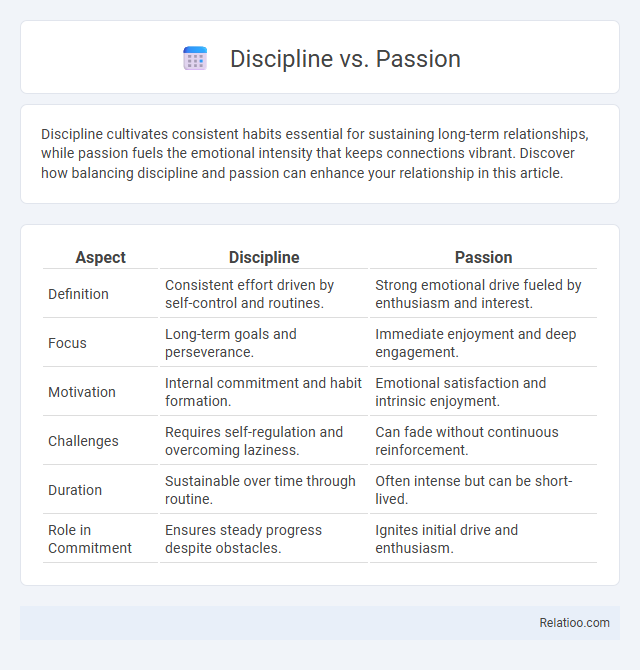Discipline cultivates consistent habits essential for sustaining long-term relationships, while passion fuels the emotional intensity that keeps connections vibrant. Discover how balancing discipline and passion can enhance your relationship in this article.
Table of Comparison
| Aspect | Discipline | Passion |
|---|---|---|
| Definition | Consistent effort driven by self-control and routines. | Strong emotional drive fueled by enthusiasm and interest. |
| Focus | Long-term goals and perseverance. | Immediate enjoyment and deep engagement. |
| Motivation | Internal commitment and habit formation. | Emotional satisfaction and intrinsic enjoyment. |
| Challenges | Requires self-regulation and overcoming laziness. | Can fade without continuous reinforcement. |
| Duration | Sustainable over time through routine. | Often intense but can be short-lived. |
| Role in Commitment | Ensures steady progress despite obstacles. | Ignites initial drive and enthusiasm. |
Understanding Discipline and Passion
Discipline serves as the structured foundation that maintains consistent progress, while passion fuels intrinsic motivation and creativity. You can harness discipline to channel your passion effectively, ensuring sustained effort toward long-term goals. Understanding the balance between these forces optimizes achievement and personal fulfillment.
The Core Differences Between Discipline and Passion
Discipline involves consistent actions driven by commitment and self-control, whereas passion fuels motivation and emotional connection to a goal. Your progress often depends more on discipline because it ensures steady effort even when passion wanes. Effort bridges the gap by applying discipline to harness passion and achieve long-term success.
How Discipline Fuels Consistency
Discipline fuels consistency by creating structured routines that keep your efforts aligned with long-term goals even when motivation wanes. Unlike passion, which fluctuates with emotions, discipline relies on deliberate habits that sustain productivity and drive steady progress. Effort is amplified through discipline, transforming sporadic bursts of energy into dependable momentum required for lasting success.
The Power of Passion in Motivation
Passion fuels intrinsic motivation, making challenges feel like opportunities rather than obstacles, which enhances long-term commitment and productivity. Your sustained enthusiasm driven by passion triggers dopamine release, reinforcing positive behaviors and boosting perseverance. Effort supported by passion transforms discipline from a rigid necessity into a rewarding process, maximizing performance and personal fulfillment.
Can Discipline and Passion Coexist?
Discipline and passion can coexist, creating a powerful synergy that fuels sustained effort and consistent progress toward your goals. Passion ignites motivation and emotional connection, while discipline ensures structured action and perseverance even when enthusiasm wanes. Balancing these elements enhances productivity and leads to long-term success in any endeavor.
Advantages of Leading with Discipline
Leading with discipline ensures consistent progress by establishing structured routines that enhance productivity and minimize procrastination. Discipline fosters resilience and self-control, enabling individuals to overcome obstacles and maintain focus on long-term goals regardless of fluctuating motivation or passion. This reliable foundation often results in sustainable success and the ability to cultivate passion through disciplined practice over time.
The Impact of Passion on Creativity
Passion acts as a crucial catalyst for creativity by fueling intrinsic motivation and sustaining prolonged engagement in creative tasks. Neuroscientific studies reveal that passion activates the brain's reward system, enhancing cognitive flexibility and idea generation. This deep emotional investment often leads to higher originality and innovation compared to discipline or effort alone.
When to Rely on Discipline Over Passion
Discipline becomes essential over passion when consistent progress and long-term goals require sustained effort beyond fluctuating emotions, especially during challenging or monotonous tasks. Relying on discipline ensures productivity and resilience when initial enthusiasm wanes, enabling individuals to maintain focus and achieve results despite obstacles. In professional and academic settings, discipline fosters habits and routines that passion alone cannot sustain, highlighting its crucial role in success and personal growth.
Harnessing Both for Personal Success
Discipline builds the foundation for consistent action while passion fuels motivation and creativity, both essential for your personal success. Effort bridges the gap by transforming passion and discipline into tangible results, maximizing productivity and achievement. Harnessing discipline to maintain steady progress and channeling passion to inspire innovation creates a powerful synergy that drives sustained success.
Discipline vs Passion: Finding Your Balance
Discipline provides the consistent framework necessary to achieve long-term goals, while passion fuels the motivation and creativity that make the journey enjoyable and meaningful. Your challenge lies in balancing these forces to maintain steady progress without burning out or losing enthusiasm. By aligning structured effort with genuine interest, you can maximize productivity and sustain lasting success.

Infographic: Discipline vs Passion
 relatioo.com
relatioo.com